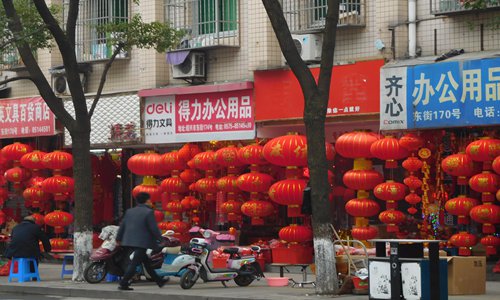Qingdao road naming rules forbid names after foreigners, foreign places
Source: Global Times Published: 2020/10/21 21:29:34

A view of stores ahead of Spring Festival in January, 2017. Photo: VCG
The civil affairs authorities of Qingdao, East China's Shandong Province on Wednesday released a regulation on naming roads, which forbids names after state leaders, foreigners and foreign places, following a nationwide battle against "non-standard" names of places.
It is believed to be the first road naming rule in the country.
The regulation states road names should not harm national sovereignty and territorial integrity, or detrimental to national dignity. They also should not undermine national unity and social stability.
Words that violate social morality and public order or words with vulgar style, strong feudal tendency, easy to be misunderstood and ambiguous, or may have other adverse effects on the society are prohibited.
Specifically, it said road names should not be state leaders, foreigners and foreign places.
Some netizens questioned the rule, saying "we are living in a global village. Why can't we use names of foreigners?" Some supported the regulation, saying naming roads after foreign places will destroy the tradition and affect the residents' cultural identity, and even the protection and inheritance of urban cultural arteries.
A report in the Qingdao Morning Post on March 2019 said staff from the Civil Affairs Bureau pointed out that 189 road names have been adjusted. Roads then were named after provincial administrative divisions and major cities in China.
Before that, during the German Occupation period, the German colonists changed some road names to German places or people. The most typical road changes around the sea were "Taiping Road" to "William Street," "Qufu Road" to "Berlin Street," and "Guangxi Road" to "Prince Henry Street.". After World War I, the road names were changed to Japanese ones--for example, "Guangxi Road" was changed to "Saga Street" and "Taiping Road" to "Maizuru Street."
Some places in Qingdao which has been named after foreign places such as such as "Vancouver Garden," "Toronto Block," and "Manhattan Square."
With the improvement in China's national strength and self-confidence, more and more people are calling for name standardization and sinization. "It is a good chance to awaken Chinese people who have been blindly worshiping foreign things and fawn over foreign countries," a Weibo user said.
Qingdao's regulation came after China's nationwide battle against "non-standard" names of places in 2018.
The campaign mainly targets improper names of newly built residential areas and major projects that have had a negative social effect, and have stirred strong public reaction--those which exaggerate and blindly worship foreign names, and repetitive names.
Following the campaign, the local government of Xi'an, Northwest China's Shaanxi Province started a campaign against non-standard place names, 18 of which were names of resident communities with foreign elements.
However, the campaign stirred some controversy as a number of local governments tried to change the names of residential communities and commercial properties, and were accused of going too far and being unreasonable.
For example, the department of civil affairs of South China's Hainan Province listed 15 hotels owned by the Vienna Hotel Group as non-standard names for using the name of Austria's capital, which glorifies foreign things. The Vienna Hotel Group later objected, saying that its brand was legal and has had a valid registration since 2012 from the Trademark Office under the State Administration for Industry and Commerce.
In the regulation, Qingdao authorities also said that road names should be comparatively stable, and names that people agree not to change will Remain.
Global Times
RELATED ARTICLES:
Posted in: SOCIETY